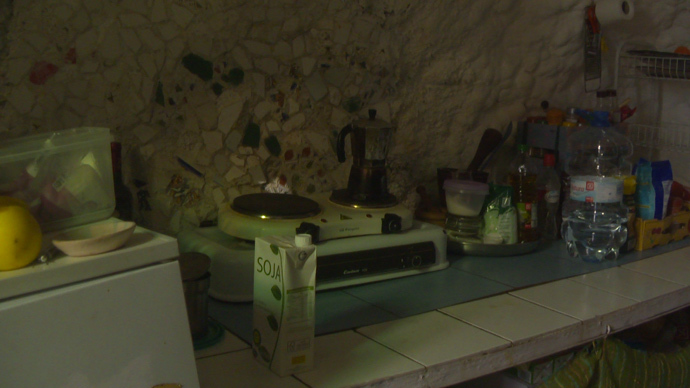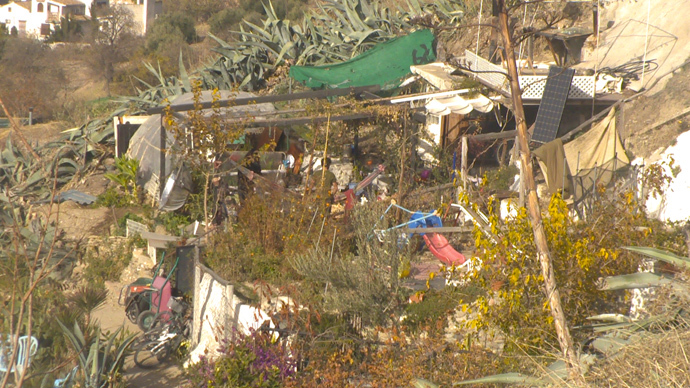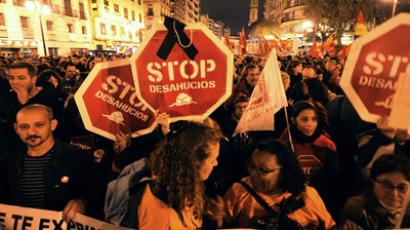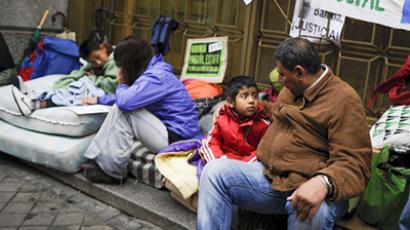'Excuse to throw us out': Spanish cave dwellers say authorities' actions 'unlawful'
A rare way of life is under threat in Spain where authorities have renewed attempts to evict dozens of cave-dwelling families from their homes in an ancient settlement in Granada. Residents say "it's a disgrace", and are determined to resist eviction.
Throughout the week dozens of activists have been protesting the eviction they deem unlawful and unfair.
San Miguel is the site of one of the four main cave neighborhoods in Southern Spain. For over a thousand years, hundreds of caves carved out of the eye-catching hilltop have been home to gypsies and other homeless settlers.
Abandoned in the 1960s, in recent times eight caves have been occupied by squatters, who reclaimed them to turn them into modest and unconventional homes.
“We’ve been living here for two years now and we really love our community. It’s the kind of place where neighbors help each other out,” cave dweller Ana told RT’s Lucy Kafanov. “We just want to live alone like this, we don’t need anything [from the city]. We have everything here.”
Now authorities are trying to resettle people from eight occupied caves citing safety and sanitation concerns at what they describe as a slum that sits above the city.
“These aren’t proper houses and it isn’t a residential area of the city. The caves aren’t safe for humans to live in. They could collapse at any moment,” Granada city urban planning chief, Paco Puentedura, said.

But the San Miguel cave dwellers say they have been the victims of the authorities, violating their human rights, and evicting people for cynical reasons only.
“The city council wants to shut down the caves, but they don’t want to tear them down. That’s why we think they really just want to get the land to use it for their own purposes,” one of the dwellers, Irma, said.
Local activist, Antonio Redondo, believes that plans to evict the cave dwellers have nothing to do with worries about comfortable and safe living conditions.
"It is a disgrace. This has nothing to do with concerns for the people. The government cares nothing for the fact that there are some 500 evictions administered in Andalusia every day. Instead, they keep trying to exploit the situation. They insist on eviction rather than carry out an assessment of the caves’ condition, or call a town hall meeting with the cave dwellers in order to explain the makeover plan and offer to relocate the inhabitants. This shows how totally unconcerned they are about these people."

Several years ago the council announced plans to turn the site into a tourist attraction. The Sacramento caveman heritage would include flamenco caves for tourists, a number of "artisan" and souvenir workshops, as well the main landmark - a hotel - which, according to the council, would "respect the harmony of the area". The caves happen to be located in a potentially lucrative location, affording the best views over the city, which relies on a robust tourism economy.
Earlier this week, Granada’s city council proposed providing
social housing to the cave dwellers.
RT's Lucy Kafanov, reporting from the site, spoke to local
residents and activists who told her this is the third attempt by
the authorities to clear cave dwellings in the past six years.
Officials have repeatedly claimed that the "hand-made" homes
built there are dangerous.
A spokesman for the cave dwellers argues their homes may be lacking fancy furniture but they are perfectly habitable.

The authorities aren’t ruling out the possibility of going to court to get an eviction order. According to the cave dwellers, the court in Strasbourg has already ruled that eviction must be suspended until they have been provided with proper accommodation.
Juan Antonio Parra told RT that should eviction take place this time round, people will band together to resist it.
"We certainly will resist, using every legal means available. Which is more than can be said of the city council, whose actions have been unlawful and underhand all along the way. First, they have no property rights on the caves. Secondly, they never did an expert assessment of the caves’ condition. There have been no cave-ins in any of the caves that the city council proclaimed to be crumbling as far back as three years ago, not even after the heavy rainfall we have had. So we can see their lie for what it is: they just need an excuse to throw us out."
Parra says that what is happening these days is in fact highly reminiscent of past events.
"This has happened before, the seizures and the evictions: under the Francoist regime, and before that, during the reign of the Catholic kings. These caves have always sheltered Arabs, Gypsies, etc. The past still prevails in this part of Granada, so we believe the authorities will not succeed here."
The government of Andalusia is expected to bring experts to the site to evaluate it. The cave dwellers are also looking for independent architects to confirm that their houses are a safe place to live.
In a bid to resolve the escalating crisis, the activists are planning to establish a co-op tenant council to help sort out property rights.
"After all, these caves belong to the original settlers. That makes the city council complicit of a fraudulent sale scheme, where all of their assets are effectively illegal," Parra told RT.
"Right now, we are attending various meetings to figure out what our nearest future looks like."
So far initial plans to convert the caves into a tourist area have been canceled due to the global economic crisis.
Spain, whose banks suffered a severe blow during the financial downturn, is said to be slowly emerging from a deep economic slump. Although Spain's economy grew 0.1 percent in the July-to-September period, it still has one of the highest unemployment rates in the industrialized world. Earlier this year, the International Monetary Fund predicted that the debt-ridden country is likely to be saddled with unemployment of about 25 percent until up to 2018. Unpopular austerity measures have led to riots across the country.














